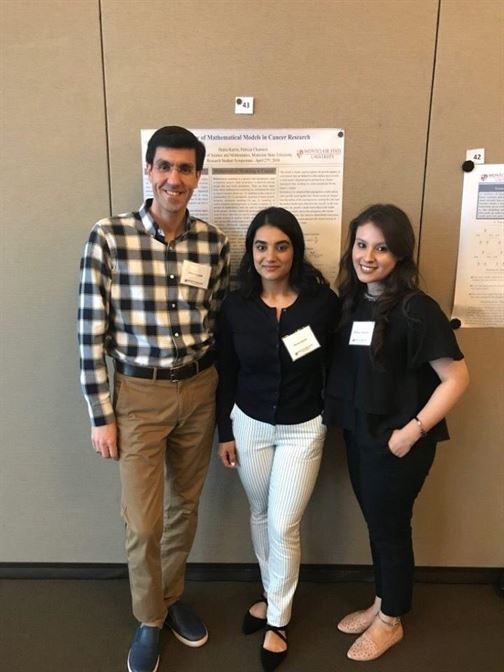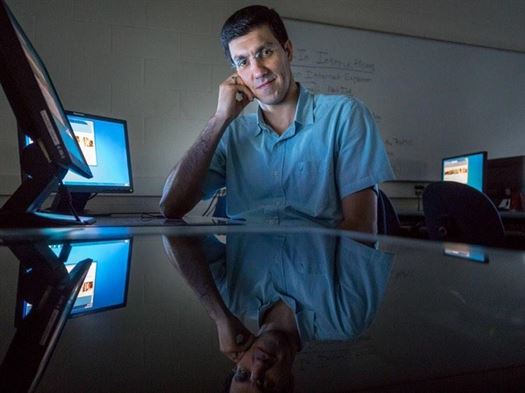Despite glowing reviews from his peers in the mathematical sciences department and strong support from his students, Dr. Amir Golnabi was denied tenure at Montclair State University after Provost Willard Gingerich decided that the professor’s research did not adequately meet the university’s standards.
The denial of Golnabi’s tenure was met with outrage from the mathematical sciences community at the university from students to professors. It seemed to them as if their support and admiration for Golnabi and what he did for the university was ignored.
Although the professor received overwhelmingly positive peer and student reviews, along with petitions advocating for the professor to receive tenure, it wasn’t enough to reverse the decision.
Golnabi held a stellar reputation throughout the university for helping students achieve success in mathematics. He even aided students in their own research projects and independent studies while managing his own research projects.
On the Rate My Professor website, a popular service students use to rate professors, Golnabi holds one of the highest ratings in the mathematics department at Montclair State, sitting at a 4.4 out of 5.
Patricia Charneco, a 2018 graduate of Montclair State with a degree in molecular biology, took an independent study with Golnabi in the spring of 2018 and was eager to expand her knowledge on how mathematics can be useful in the biological and health field.
“A classmate and I approached Golnabi and asked for an opportunity to do research with him,” Charneco said. “We ultimately studied how mathematical models could be used to represent, analyze and make predictions on real-life situations; cancer growth being one of them. We learned a lot throughout the semester and through his teaching skills my research partner and I gained a better understanding of how mathematical functions can play a big role in the medical field.”
Charneco had struggled with mathematics throughout her years of education. However, her experience with Golnabi as a professor helped grow her confidence in the subject and was a major reason as to why she was able to also pass her calculus course.
“I had failed calculus more than once at my community college and the thought of having to take it again at Montclair Stare frightened me,” Charneco said. “I put off taking calculus until my senior year at Montclair State. Thankfully, I was lucky to have Golnabi as my professor. His teaching skills helped me overcome that fear of mathematics.”
While the overall perception of Golnabi was overwhelmingly positive among students, he always believed that the school seemed to prioritize research more than anything else. He mentioned that the university set the bar low for teachers in the mathematical sciences department in terms of the quality of their classes, or how happy the students were in the class.
“As long as you avoided making the students unhappy, you were good,” Golnabi said. “It really didn’t matter about how you taught, even if your classes are super boring or ineffective.”
According to Golnabi, professors in the mathematical department were expected to participate in research projects, with the hopes that the school could potentially be designated as a Research I university at some point.
Montclair State, while considered a public research university, may not exactly hold the prestige and reputation of other research universities in the East Coast such as Rutgers or Princeton since they do not hold the distinction of being a Research I institution.
Golnabi believes that the university could be going through an identity crisis with research being prioritized over education.
“They have been dealing with this for some time now, as they want to be something that they are not. They are great at things that focus more on education and educating future educators, but the current administration wants to change this model. This has created a dilemma in several of their departments,” Golnabi said.
This could explain why in a meeting with the dean this past November, Golnabi was told that his teaching was taking too much of a precedent over his research.
“I was told that my teaching was too good, you have spent too much time on your teaching,” Golnabi said. “[They also said] if I didn’t spend that much time on my teaching, your research would be even better.”
Golnabi has been peer-reviewed by his colleagues on his work prior to his most recent evaluation in February, and has received positive feedback on his research. His research has been published and he had collaborated with Dartmouth College on research projects, where he received his PhD.
Notably, he had also been a part of a study with St. Barnabas Hospital in Livingston, New Jersey.

Dr. Golnabi helped Patricia Charneco and Huma Karim with their independent study in the spring of 2018.
Photo courtesy of Patricia Charneco
Hanan Zatloff, a former student of Golnabi and a 2016 graduate of Montclair State, mentioned that the project had the potential to reveal various health factors related to an unborn baby and the mother allowing for a prediction of the baby’s health at birth.
“Math and physics research can sometimes leave the realm of applicability, but Dr. Golnabi’s work was readily useful for society and had strong interest from a well-known hospital,” Zatloff said. “Many research endeavors have no obvious application toward societal progress and I felt Dr. Golnabi’s research was very much a worthwhile and apparently useful endeavor.”
In February, when Golnabi was up for tenure, there was a process that he had to go through that would decide his future as a professor at Montclair State. This peer-review process evaluated his teaching, research and service, among other things.
Golnabi received positive feedback from the Department Personnel Advisory Committee (DPAC), which is made up of six tenured members of the mathematical sciences department. He also received praise from the Department of Mathematical Sciences chairperson.
The DPAC praised him for being a passionate and dedicated teacher, someone who empowered his students to become leaders. The department chairperson credited him with developing a “strong, interdisciplinary research program which adds a new dimension to the existing research efforts in the department.”
However, Provost Willard Gingerich felt differently.
In his evaluation of Golnabi, Gingerich was quoted as saying that “in [his] academic judgement, Dr. Golnabi’s record of independent contributions to his scholarship of his discipline is not adequate to merit tenure or promotion to associate.”
Despite a letter written from the entire tenured mathematical sciences department to the provost with the hopes of reversing the decision, as well as a grievance filed by the Council of New Jersey State College Locals, the university’s decision remained unchanged.
Due to this, Golnabi made the decision not to return for the upcoming academic year and has no plans on coming back.
Gingerich refused to disclose any personal matters in regards to the departure of the math professor, but did mention that the decisions on faculty personnel are “well-defined and not open to public discussion.”
Gingerich also discussed briefly what these reviews looked like.
“In faculty personnel reviews, research productivity and impact counts 40%, teaching effectiveness counts 40% and service to the university counts 20%,” Gingerich said.
Golnabi questioned the decision by the provost.
“The same provost who said that now my research is not adequate, [is] that same person last year [that] told me that I was on a good track and my research was satisfactory,” Golnabi said.
Additionally, he was given no real warning about his research and believes that the system in which he was evaluated is flawed.
“If they were saying my research wasn’t satisfactory, why were no red flags presented [to me],” Golnabi said. “Specifically last year, there was no indication that my research wasn’t enough.”
Golnabi thinks that there could be more to their decision than meets the eye.
“It leads me to believe that something else is happening here,” Golnabi argued. “It is not an objective way of evaluating my research. If my peers were saying for example, that my research was not enough, that would be a different story. If I don’t survive the peer-review process, then I don’t deserve tenure or promotion, but the peer-review process is being ignored.”
Students were equally outraged with the decision. A group of students along with Golnabi had a Zoom call in June to discuss whether further action should be taken. They have also created a group chat in hopes of collaborating ideas together.
Anthony Tamberelli, a sophomore marine biology and coastal sciences major at Montclair State and a former student of Golnabi, discussed what this group is doing to bring light to his departure.
“Besides taking interviews from the students in [Golnabi’s] previous classes, we felt that reaching out to alumni could provide valuable testimonies as well as some first-hand experiences that could vouch for the presence of this currently ‘broken’ system,” Tamberelli said. “Spreading the word through our own mediums, passing on the story to other friends and also through other professional connections we might have, was another tactic we felt would ‘fill in the gaps’ and distribute the story even further.”
It’s also important to note that the provost who evaluated Golnabi has a degree in English, as Tamberelli questioned the department’s qualifications.
“The flaw mainly stems from the fact that those in the provost department that check the professors’ qualifications are not in the correct position to do so,” Tamberelli said. “Only those who have experience in the subject at hand, such as mathematics professionals checking mathematics professors, should be responsible for renewing or terminating tenures for professors.”
Tamberelli and his fellow students are committed to making sure the flaws in the tenure system change and other professors don’t have similar problems to Golnabi.
“Fixing the broken cog or cogs in the system that permit these dubious and inequitable procedures to be conducted without reprimand should and will be the first step to buffing out the flaws in this system,” Tamberelli said.



